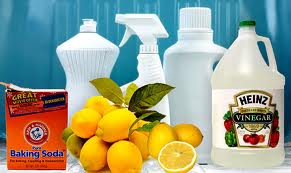Natural Cleaning products are just as effective as popular chemical brands. The upside is that natural cleaning products don’t leave harmful fumes or residue, and so you are left not only with a clean home, but a safe one, too.
Chemical brands have the tendency to kill all bacteria – both good and bad. What we don’t realize is that we need good bacteria in our micro ecosystem for a healthy environment. Even worse, of the chemicals used in cleaners that have been studied, many are linked to sicknesses like asthma, skin diseases and cancer.
Commercial household products are very big business. Store shelves are filled with hundreds of specialized formulas which promise to solve every imaginable problem, but they are expensive, chemical-based, and needlessly expose families and our environment to highly dangerous and toxic ingredients.
The 3 basic, natural ingredients
Vinegar:
This can be used in any room in the house, and the bonus is that it leaves no smell once it has dried, unlike harsh chemical cleaners that promise that `clean citrus or pine forest smell.`
To use vinegar throughout the house for cleaning, mix 1 part vinegar with 1 part water, and use as you would normally use any other cleaning product. Use it on floors, work surfaces, mirrors, bathtubs, basins and in toilets. When cleaning the toilet, the vinegar can be used undiluted. After flushing, pour it into the toilet bowl and scrub as normal. Always be sure to test it on a small area first to ensure that it will not damage any of the surfaces you intend cleaning. On this note, avoid using vinegar on marble surfaces and tile grouting.
Vinegar also makes an excellent natural fabric softener. This is ideal for people who are allergic to chemical based fabric softeners. Simply add half a cup of vinegar to the rinse cycle in place of fabric softener. An added advantage is that vinegar also helps to break down laundry detergent or washing powder, making it excellent for people who are allergic to the smallest amount of chemical residue on their skin. Always be sure to use white vinegar when dealing with clothing or light coloured surfaces, as brown vinegar can discolour certain fabrics and surfaces.
Baking Soda:
Baking soda has many uses. It acts as a deodorizer and is excellent for cleaning stubborn dirt such as that found on stove tops. When combined with vinegar, it can be used as an all-natural drain cleaner. Simply put around three quarters of a cup of baking soda down the drain and then pour half a cup of vinegar down the drain. Place the drain plug in the drain hole for 30 minutes. After that, pour a kettle of boiling water down the drain and you should find that the drain is unclogged. Placing an open box of baking soda inside a fridge or freezer can help absorb unpleasant odours.
To deodorize carpets, baking soda can be sprinkled on them and vacuumed up after 15 minutes. When mixed with equal parts of water, it can be used as a gently abrasive cleaner (be sure to test on a small, out-of-the-way area of the product you intend cleaning first).
Lemons:
Lemons also have many uses when it comes to cleaning. They are excellent for removing tarnish stains on silver and hard water deposits. Lemon or lime juice can be used to remove surface rust on items. Sprinkle some salt on the item and put the lime or lemon juice over it. Leave it on for a few hours and scrub the affected item. Place lemon peels into garbage disposal units to deodorize them. Lemon juice is able to dissolve soap scum in bathrooms. Sprinkle baking soda on a cut lemon to scrub surfaces and dishes. Mix half a cup of lemon juice with 1 cup olive oil for a natural furniture polish.
Natural Cleaning Reference Guide
Baking Soda
Sodium bicarbonate, a naturally occurring mineral
Best uses:
- Cleans
- Deodorizes
- Softens water
- Scours as a mild abrasive
- Neutralizes acids
- Produces carbon dioxide when mixed with acids such as white vinegar
Borax
Sodium borate, a naturally occurring mineral composed of sodium, boron, oxygen and water
Best uses:
- Cleans
- Deodorizes
- Disinfects
- Softens water
- Cleans many surfaces including wallpaper, painted walls and floors
Essential Oil
A concentrated, fragranced oil extracted from a single plant, most often used with a vegetable-based carrier oil
Best uses:
- A few drops can be added to homemade cleaning products for fragrance
- Natural air freshener ingredient
Caution:
- Highly concentrated
- Keep away from kids and pets
- Never drink or consume essential oils
- Some essential oils should not be handled during pregnancy or when nursing
- People with asthma or allergies should avoid using essential oils
- Can cause skin irritation, should never be used directly on skin
The original “oxy” cleaner, usually available in a 3% strength
Best uses:
- Cleans
- Super anti-bacterial agent
- Sanitizes cutting boards and food prep surfaces
- Removes protein-based stains such as blood
Lemon Juice
Nature’s perfect “green cleaning” citrus fruit
Best uses:
- A mild, natural bleach
- Acidic cleaning agent
- Natural deodorizer
- Natural antibacterial
Microfiber Cloths and Dusters
Microfiber cloths and dusters are made from nylon/polyester blended fibers that are microscopically split and woven together to create a fabric that traps and removes dirt very effectively
Best uses:
- Traps and removes dust and dirt
- Cleans glass, windows, mirrors with plain water
- Can be used on any surface
- Reusable many times
Caution:
- Do not machine dry using dryer sheets as the chemicals will render the microfiber ineffective
- Use with caution on LCD, CRT and plasma screens as cloth can scratch sensitive surfaces
Washing soda
Sodium carbonate, in the same family as baking soda. It has a higher pH level of 11, which makes it slightly more caustic
Best uses:
- Laundry booster
- Removes greasy or oily stains
- Neutralizes odors as well as baking soda
- Disinfects
- Softens water
Caution:
- Keep away from kids and pets
- May irritate skin; use rubber gloves
- Do not use on no-wax floors, aluminum, or fiberglass surfaces such as sinks and bathtubs
- Do not use to unclog drains
- Do not use on wool or silk fabrics
Where to buy:
- Can be found in the laundry section of most supermarkets
White vinegar
Acetic acid
Best uses:
- Cleans
- Sanitizes
- Eliminates mildew
- Deodorizes
- Cuts grease
- Removes wax build-up
- Natural fabric softener
Zeolite
A naturally occurring crystallized volcanic mineral
Best uses:
- Removes odors
- Non-fragranced
- Great for pet odors
- Safe for litter boxes
- Sold in reusable pouches; after prolonged use, “recharge” in direct sunlight for a few hours
- Also sold in loose granules
- Absorbs moisture, therefore can potentially reduce mold in smaller spaces
- Environmentally safe
Sources:
http://housekeeping.about.com/cs/en…
http://www.thegoodhuman.com/2007/11…
http://www.cncahealth.com/health-in…
http://www.greenparenthood.com/blog…
http://www.back-to-basics-cleaning.com
http://www.naturalnews.com

If you've found value in our articles, we invite you to support the release of our brand-new book, "Gratitude Practices for Kids: A Practical Guide for Adults to Instill a Spirit of Appreciation and Positivity in the Next Generation."
"Gratitude Practices for Kids" brings together over 25 innovative and accessible practices designed to enhance gratitude in everyday life. This comprehensive guide is backed by 17 scientific studies, ensuring each concept is grounded in research, underscoring our commitment to nurturing growth, emotional intelligence, and positive interactions between adults and children.
We encourage you to opt for the paperback version to celebrate this new release. Dive into its fresh pages away from digital distractions, allowing you to immerse yourself in the transformative practices it offers.
Over recent years, Wake Up World has faced significant online censorship, which has impacted our financial ability to operate. Moving into book publishing represents a strategic step to secure the ongoing funds needed to continue our mission. By purchasing Gratitude for Kids, you help us keep our content free and accessible to everyone, avoiding needing a paywall. With over 8,500 articles published in the last 13 years, we remain dedicated to keeping our valuable content open to all.








